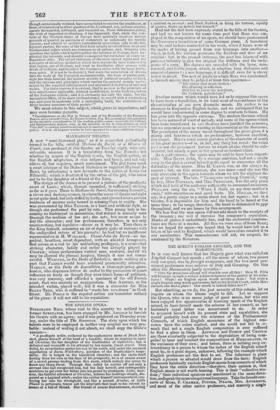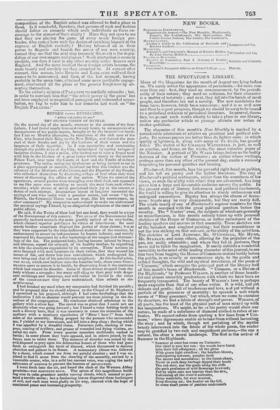THE QUEEN'S ENGLISH CONCERT, AND THE HARMONICON.
IT is very well known that her Majesty gave what was called an English Concert last month ; all the music of which, two pieces only excepted, was by foreign composers, and the two most pro- minent performers were natives of Italy and Germany. On this affair the Harmonicon justly remarks- " How the musicians abroad will chuckle over all this 1 How M. Fdtis will triumph in such a virtual acknowledgment of the justice of his stric- tures 1 What ! no English opera worth selecting from ! Not even a single English song worth performing before the British Court, while Mer. cadante can find a place 1 Our music is indeed fallen low 1" But admitting, as we do, the just severity of this rebuke, let us inquire on whom the blame ought to fall, Let us suppose the Queen, who is no mean judge of good music, but who can have enjoyed few opportunities of knowing much of the English school, to have herself made the scheme of her concert, as her husband's royal father was accustomed to do. In order to acquaint herself with its present state and capabilities, she would probably look over the schemes of the Philharmonic Concerts, of which English musicians of the highest emi- nence have the entire control, and she could not fail to re- mark that not a single English composition is ever suffered to find a place in them. ATTWOOD and BISHOP and CROTCH are there constantly subjected to the degradation of being com- pelled to hear and conduct the compositions of MERcAL•A.Nvz, to the exclusion of their own ; and hence, there is nothing very ex- traordinary in a person to whom the riches of the English school must be, in a great degree, unknown, following the example which English professors are the first to set. The inference is plain which a person so situated would draw from the facts: English professors habitually exclude English music from concerts of which they have the entire direction—therefore, their opinion is, that English music is not worth hearing. This is their " collective wis- dom ;" their individual opinions are manifested in the same direc- tion, and speak the same unequivoeallanguage. Take the benefit con- certs of Mom, F. CRAMER, POTTER, NEATE, MTS. ANDERSON, and most of the other native professors, and scarcely a single composition of the English school was allowed to find a place in them. Is it wonderful, therefore, that persons of rank and fashion should follow an example which such individuals as these en- courage to the utmost of their ability ? Have they not eyes to see that they are playing the game of every needy foreign pre- tender, who comes here with the design of enriching himself at the expense of English credulity ? Having laboured all in their power to degrade and banish the music of our own country, cannot they see that the next step (scarcely the next) is the degra- dation of our own singers and players ? Such infatuation is scarcely credible, nor does it exist in any other country under heaven save England. And the more insolent these fcreign artists become, the more tamely and servilely are they crouched to. At concert after concert, this season, have Runixi and LABLACHE suffered their names to be announced, and then, at the last moment, having probably in the mean time, obtained some more profitable engage- ment, overturned all the plans of the pauvre benVi clam by ab- senting themselves.
To the editor's opinion of PAGANINI we cordially subscribe ; but, in order to convince him that " the whole power of the press" has not been employed in unqualified panegyric and unbounded appro- bation, we beg to refer him to our remarks last week on " the English PAGANINI."



























 Previous page
Previous page